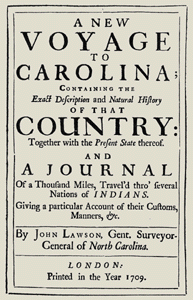 John Lawson - Survey-General of North Carolina - was an explorer, naturalist, and writer/illustrator of A New Voyage to Carolina. He was born in Scotland in 1674, but was schooled in England. He first traveled to Carolina in 1700, where he explored and recorded his detailed impressions of Carolina - the land, Indians, flora, and wildlife.
John Lawson - Survey-General of North Carolina - was an explorer, naturalist, and writer/illustrator of A New Voyage to Carolina. He was born in Scotland in 1674, but was schooled in England. He first traveled to Carolina in 1700, where he explored and recorded his detailed impressions of Carolina - the land, Indians, flora, and wildlife.Below are excerpts from Lawson's 1709 letter to the Lords Proprietors:
...This Part of Carolina is faced with a Chain of Sand-Banks, which defends it from the Violence and Insults of the Atlantick Ocean; by which Barrier, a vast Sound is hemm'd in, which fronts the Mouths of the Navigable and Pleasant Rivers of this Fertile Country.
...Topsail Inlet is above two Leagues to the Westward of Cape Look-out. You have a fair Channel over the Bar, and two Fathom thereon, and a good Harbour in five or six Fathom to come to an Anchor. Your Course over this Bar is almost N. W. Lat. 34o 44.
...The Fishing-Trade in Carolina might be carried on to great Advantage, considering how many Sorts of excellent Fish our Sound and Rivers afford, which cure very well with Salt, as has been experienced by some small Quantities, which have been sent abroad, and yielded a good Price. As for the Whale-fishing, it is no otherwise regarded than by a few People who live on the Sand-Banks; and those only work on dead Fish cast on shoar, none being struck on our Coast, as they are to the Northward; altho' we have Plenty of Whales there.
...Live-Oak chiefly grows on dry sandy Knolls. This is an Ever-green and the most durable Oak all America affords. The shortness of this Wood's Bowl, or Trunk, makes it unfit for Plank to build Ships withal.
... The Pellican of the Wilderness cannot be the same as ours; this being a Water-Fowl, with a great natural Wen or Pouch under his Throat, in which he keeps his Prey of Fish, which is what he lives on. He is Web-footed, like a Goose, and shap'd like a Duck, but is a very large Fowl, bigger than a Goose. He is never eaten as Food; They make Tobacco-pouches of his Maw.
... We have a great pied Gull, black and white, which seems to have a black Hood on his Head; these
lay very fair Eggs which are good; as are the young ones in the Season.
... Porpoises are frequent, all over the Ocean and Rivers that are salt; nay, we have a Fresh-Water Lake in the great Sound of North Carolina that has Porpoises in it. As to the Porpoises, they make good Oil; they prey upon other Fish as Drums, yet never are known to take a Bait, so as to be catch'd with a Hook.
... Oysters, great and small, are found almost in every Creek and Gut of Salt-Water, and are very good and well-relish'd. The large Oysters are excellent, pickled.
... The large Crabs, which we call Stone-Crabs, are the same sort as in England, having black Tips at the end of their Claws. These are plentifully met withal, down in Core Sound, and the South Parts of North-Carolina.
... Shrimps are very plentiful and good, and are to be taken with a Small-Bow-Net, in great Quantities.
... All these things duly weighed, any rational Man that has a mind to purchase Land in the Plantations for a Settlement of himself and Family, will soon discover the Advantages that attend the Settlers and Purchasers of Land in Carolina, above all other Colonies in the English Dominions in America.